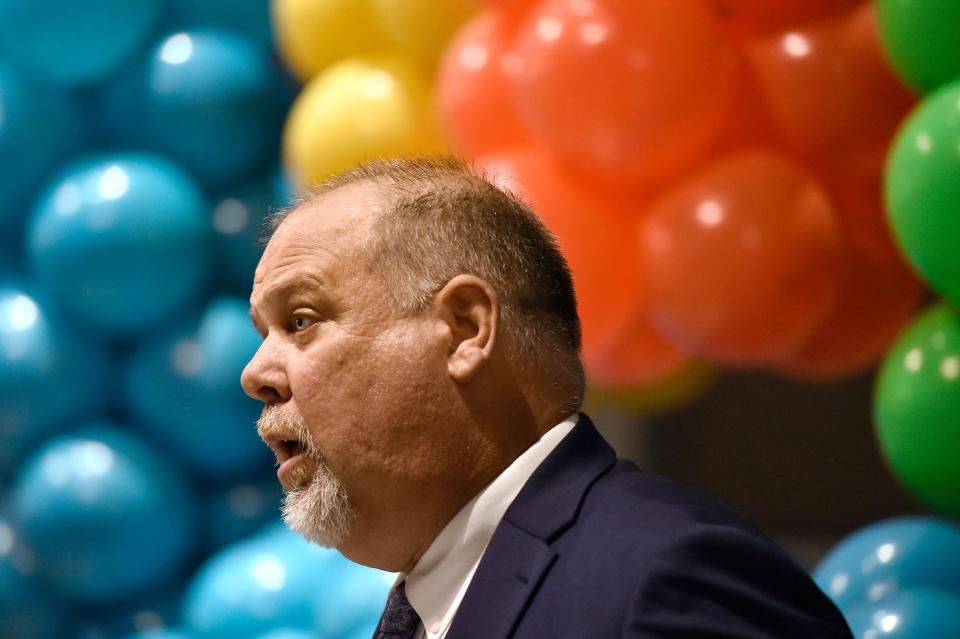GAINESVILLE — After a violent crash killed eight of their colleagues and injured dozens more, the path to recovery for the migrant farmworkers looked long.
Rigoberto Gregorio shattered his femur, leaving the 30-year-old in a wheelchair and unable to bathe himself.
Ramón Pérez Ponce endured ongoing and radiating pain, prompting the 39-year-old to dial 911 one night while he struggled to breathe.
Carlos Pérez Jiménez suffered a brain injury, landing the 28-year-old in a Jacksonville rehabilitation center for memory and strength therapy.
The tragedy rendered the laborers unable to work. It also has left them caught in a dizzying system where they’ve felt forced to weigh their health against the chance to work again in the United States.
Five workers told the Tampa Bay Times they’ve desperately wanted to stay in Florida to continue medical treatment for ailments including broken bones and head injuries but have feared deportation.
The vast majority of workers involved in the May 14 crash outside Ocala were temporary migrant laborers who traveled to the U.S. from Mexico to work for Olvera Trucking Corp. on an agricultural visa known as the H-2A. They’d been on their way to harvest watermelons at a Dunnellon farm when police say an impaired driver collided with their bus and sent workers — who weren’t provided seat belts — flying.
The workers’ visas expire this month, which has made them unsure whether they can legally remain in the U.S. while their injuries heal.
Three labor attorneys told the Times the experience of the Olvera laborers highlights gaps in worker protections under the H-2A program.
The program’s rules don’t address whether laborers should be afforded extended time in the U.S. for treatment of work-related injuries, or whether employers should provide housing during that time.
“This is a real issue,” said Lori Johnson, senior attorney at Farmworker Justice, a nonprofit that advocates on behalf of laborers.
The U.S. Department of Labor, which oversees worker safety for the H-2A program, declined to comment.
Farmworkers are commonly injured on the job. Agricultural work remains one of the most dangerous professions in the U.S., according to federal data. While temporary agricultural laborers are covered under workers’ compensation insurance, experts say leaving the U.S. can make it more difficult to ensure they receive proper care and benefits.
As of Friday, a handful of workers involved in the collision remained at rehabilitation centers in Florida.
Employers who hire farmworkers through the H-2A visa program must provide housing for the duration of their job in the U.S. They are also responsible for transporting laborers to worksites.
For the Olvera workers, their Florida assignment harvesting watermelons ended this week. Workers didn’t know whether the company would continue to provide housing at a Gainesville Days Inn if they stayed for physical therapy and follow-up surgeries.
“We don’t know anything about these kinds of cases,” said Pérez Ponce, whose visa expired Tuesday. “I would like to receive medical attention for my back pain, my jaw and injured ribs — but at the same time, I want to know where I am going to live because I don’t want to live on the street or be homeless.”
Olvera’s president and vice president did not respond to multiple requests for comment about plans for the workers’ visas and housing.
Experts and federal officials said the injured farmworkers could stay in the U.S. legally if they apply for a visitor visa — at least while the process is pending.
But the workers expressed confusion and fear to the Times. They scrambled for information while nursing wounds and caring for co-workers. They flip-flopped between saying they planned to stay and go.
On Tuesday, they needed to make a decision.
Either board a company-provided bus back to Mexico. Or gamble for the chance to recover in Florida.
“I’m just waiting”
Before they were injured, the laborers planned to continue work with Olvera in Georgia and Texas. With each move, they said, they’d be issued an updated work visa.
But their injuries made the strenuous labor of agricultural work impossible. Ailments plagued them: concussions, broken arms and ribs and post-traumatic stress punctuated by insomnia that took them back to the crash scene.
Unable to work, they spent their hours in the Days Inn calling family members and dreading the hour when their pain medication wore off.
Olvera moved some of the wounded to more accessible rooms, workers said, away from the bunk beds they’d previously shared.
While his colleagues recovered at the hotel, Pérez Jiménez worked to regain his balance.
Pérez Jiménez doesn’t know how he arrived at Brooks Rehabilitation Center in Jacksonville. He’d awakened confused in a hospital bed after the crash. The last thing he remembered was his co-workers’ screams.
Doctors, Pérez Jiménez said, told him he hit his head hard during the collision, injuring his brain. He’s undergoing physical therapy to strengthen his legs, biceps and abdomen.
On a recent afternoon, nurses helped him keep his muscles active as part of his recovery. He carried exercise balls, which resembled the watermelons he used to pick in Dunnellon.
Pérez Jiménez said he’s grateful that he’s so far escaped the nightmares that haunt his co-workers.
But like them, he’s worried about the future. He’s unable to return to his native Chiapas, Mexico, until he recovers further.
Pérez Jiménez said only family members of his employer have visited him. They haven’t discussed what comes next.
“They have not told me anything,” he said. “I’m just waiting.”
A risky return
Each of the workers believed they needed to leave the U.S. this month. Some of their visas expired June 4, immigration documents show.
Luis Manuel López Rojas wanted to stay in Florida for physical therapy. His injuries, he said, ended an opportunity to earn savings for his family back home and left him fearing long-term side effects.
López, who broke three ribs and his right arm, said his doctors told him he was at risk of developing asthma because of the fractures.
As the workers recuperated, advocates and charities dropped by the Days Inn to deliver snacks, water and $60 Visa gift cards. All five injured farmworkers said they received no word from their employer about housing or visas, even as their deadline neared.
Without the work-provided housing, they said, they had nowhere to go.
López, 38, grew increasingly nervous that he’d end up on the streets, unable to work or speak English.
Brent Probinsky, a workers’ compensation attorney who is representing López and six other wounded farmworkers, said all of his clients wanted to stay.
He told the Times he reached out to Olvera’s representatives about extending their H-2A visas for an additional 30 days but said he didn’t hear back. The company, which has workers’ compensation insurance, should pay for the hotel while the workers recover, Probinsky said.
“Maybe they just want to walk away from this and ship these guys back to Mexico,” Probinsky said. “But that’s not the way it works.”
Probinsky said he filed requests on behalf of his clients for visitor visas.
On Monday, farmworkers told the Times they remained confused about their legal status. Their documents showed a firm visa expiration date. It was difficult for them to see beyond it.
U.S. Citizenship and Immigration Services sometimes provides special support to temporary visitors who face unforeseen circumstances like medical emergencies, including extending their stay within the country. (The federal agency declined to comment on the Olvera worker situation, saying it does not discuss individual cases.)
But farmworkers injured on the job are rarely successful at obtaining visa extensions or changes in visa type to receive medical care in the U.S., three attorneys who work with H-2A employees said. The process is discretionary, they said, and depends on the facts of each case.
Laborers can stay in the U.S. while their applications are pending. The review process can take months, buying them time to receive additional medical care in the country.
But the workers who spoke to the Times were skeptical.
Lawyers and advocates told them different things, Pérez Ponce said. Some said they could get an extension on their H-2A visa; others said they needed an entirely new visa. The information was dizzying, and the facts felt elusive. They didn’t know what to trust.
Returning home also carried risks.
Florida workers’ compensation may pay for care in other countries, but attorneys encourage clients to complete their recovery within the U.S. when possible.
“It’s just a whole lot easier to coordinate it here,” said Joseph Maus, a Fort Lauderdale-based attorney who frequently represents migrant workers. “There’s a much higher level of comfort that the person is going to get the care they need.”
Farmworkers often come from rural areas, attorneys and advocates say, and may struggle to find transportation or housing to receive treatment in larger cities.
All but one of the injured workers who spoke to the Times said they lived in remote parts of Mexico.
“I’m a bit nervous about that, honestly,” said Gregorio, the worker who broke his femur as well as three ribs. “There are some specialists, I think, but they are far away and maybe not of the same category or level as those in the United States.”
The only place to go
At the Days Inn, the farmworkers said they waited for answers that never arrived.
They wanted a chance to return to the U.S. for work, so staying past their visa expirations frightened them.
The wrong move could be dire, but the clock was ticking.
Workers who remain in health care facilities, like Pérez Jiménez, are unsure what will happen after their treatment is complete.
Unlike the others, Pérez Jiménez said he has not spoken with a lawyer. His visa already expired.
The laborers debated what to do until the last minute, just hours before they were set to leave.
At around 5 p.m. Tuesday, a red-and-gold charter bus rolled into the Days Inn parking lot.
It dwarfed the size of the bus the farmworkers had been on exactly three weeks earlier, when the crash upended their lives.
More than a dozen boarded the vehicle, a sling visible on one laborer’s arm.
At least two of the workers the Times spoke to said they planned to take the ride home.
Gregorio headed back to Querétaro by plane the next day on a ticket provided by his employer. He was equipped with a wheelchair and walker, the last to leave the Days Inn, according to an advocate who had been staying at the hotel since the collision.
Without any guarantees, Gregorio said, home was the only place to go.
“I don’t know how long it will take to recover,” he said. “Two? Four months? Who knows.”
Times staff writer Christopher O’Donnell contributed to this report.
Signup bonus from





